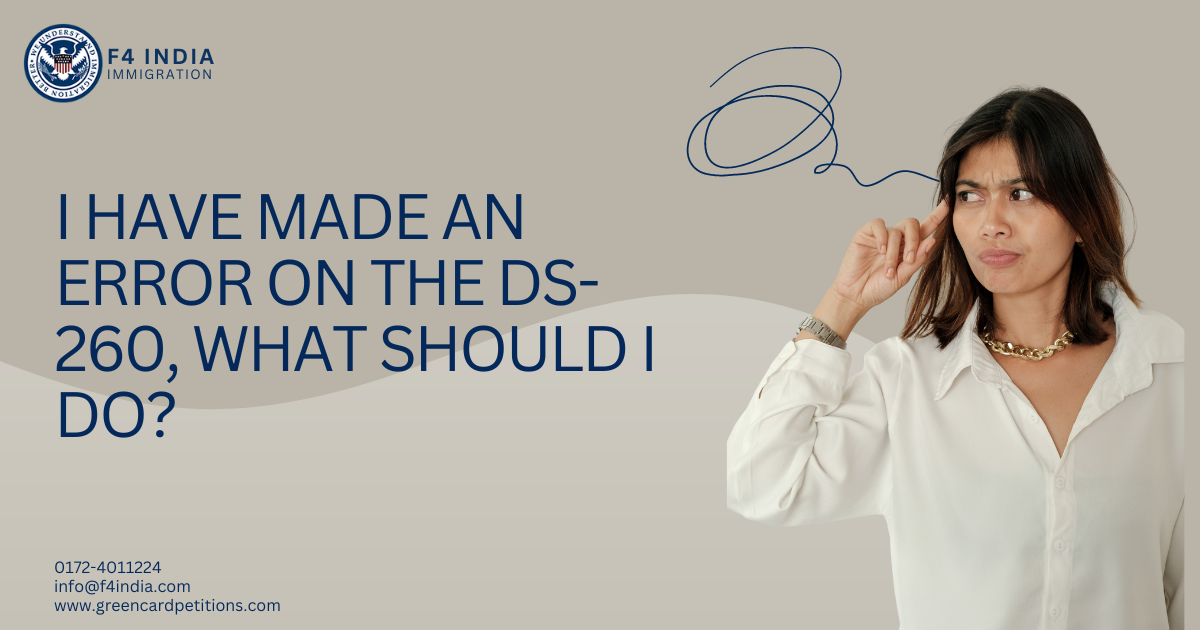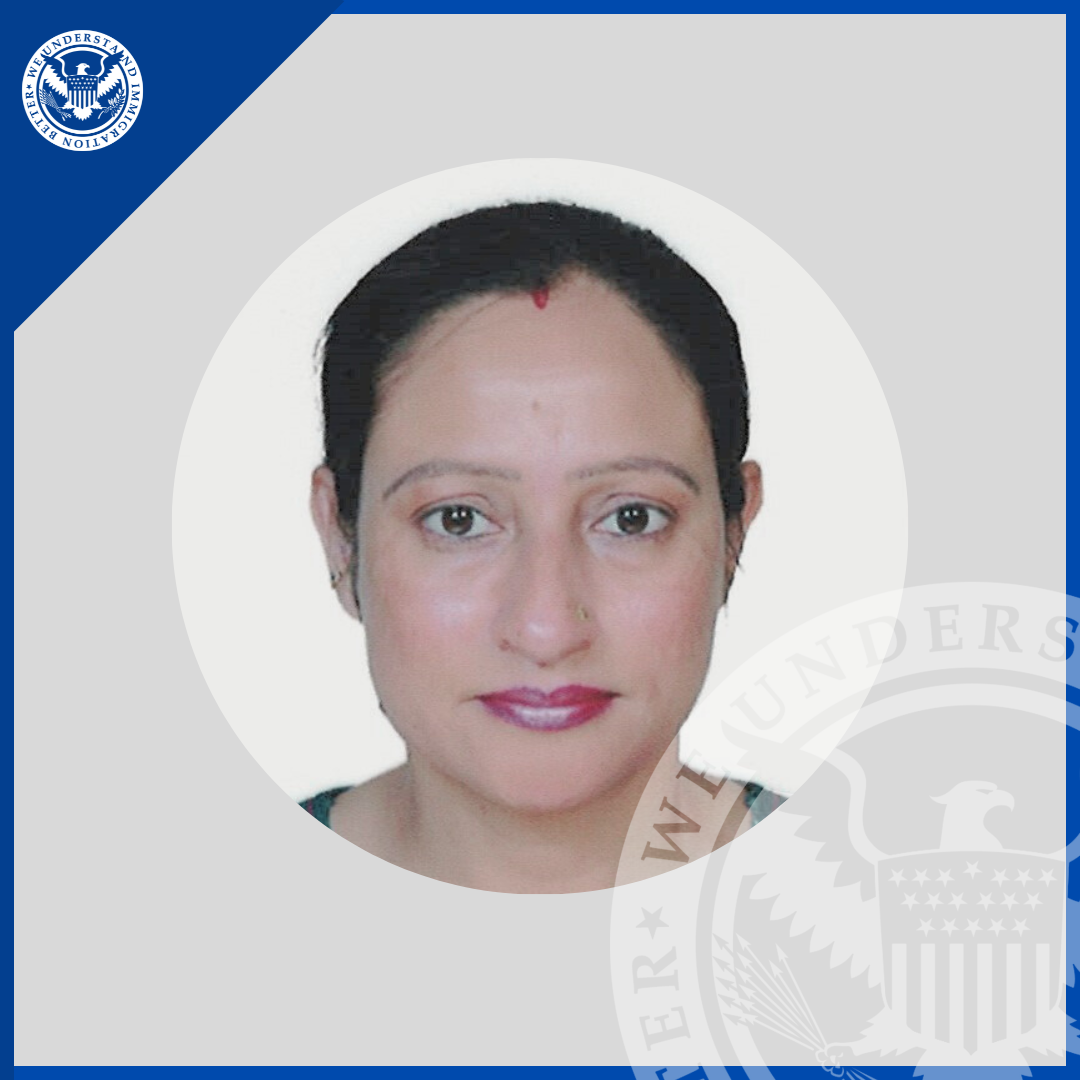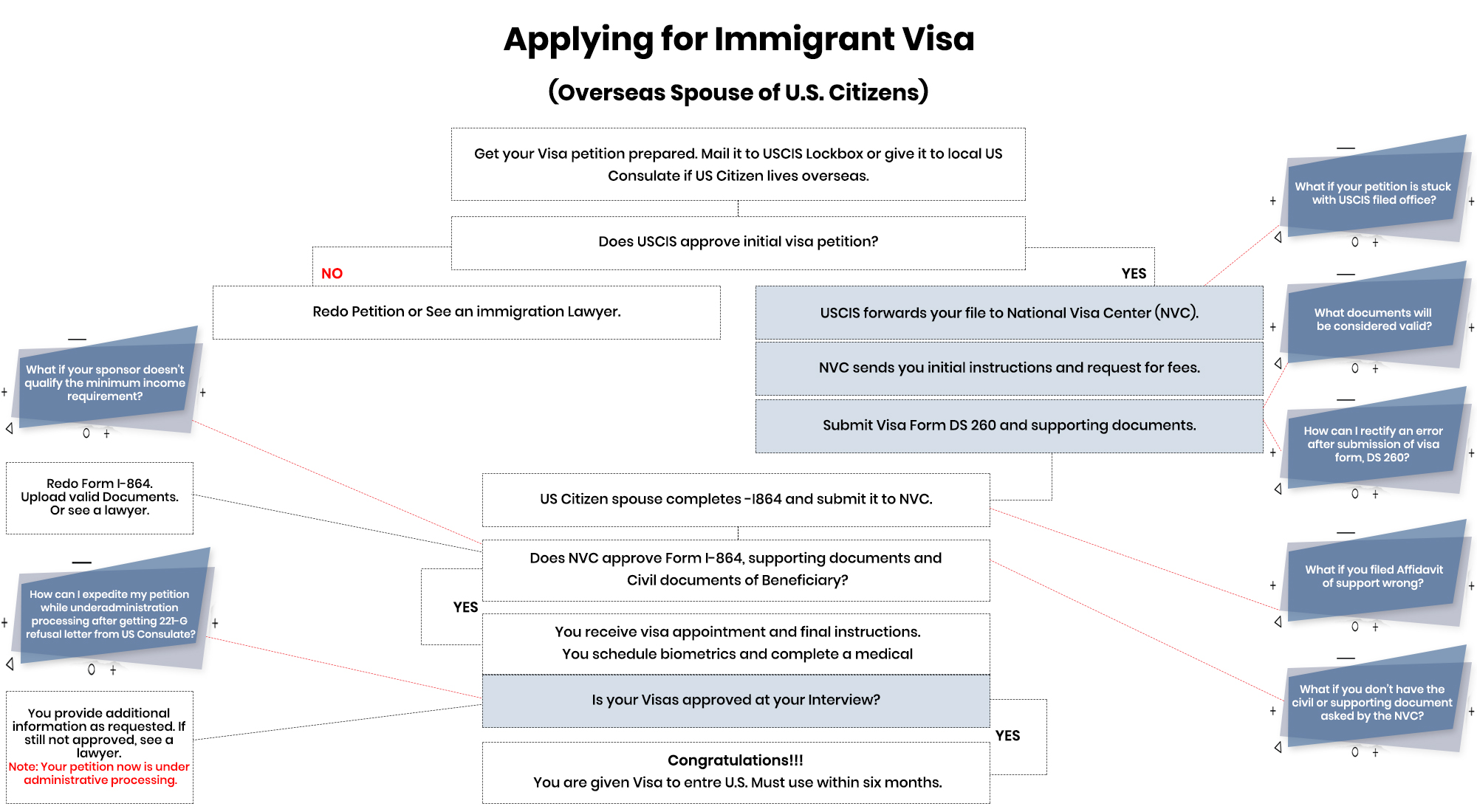I HAVE MADE AN ERROR ON THE DS-260, WHAT SHOULD I DO?

Last fall, the Department of State replaced the immigrant biographic form (DS-260 form) with a new biographic form (DS-260 form). Unlike the previous paper-based biographic form, the application/form is now an online form.
A person cannot submit the online form until the immigrant case is forwarded to NVC because the applicant needs the following numbers: (1) the NVC case number; (2) the NVC invoice ID number; and (3) the beneficiary ID number. The NVC reviews the DS-260 to see if what (if any) additional documentation is needed before the case can be scheduled for an interview. For example, if the questionnaire reveals a previous marriage then the NVC will require the divorce decree or a death certificate before the case is scheduled for an interview. Likewise, if the questionnaire reveals that the person has lived in another country for at least one year since the age of sixteen (or lived in a different part of the same country for at least six months after the age of sixteen), the NVC will require the applicant to get a police clearance from each of the countries.
One problem with the DS-260 is that it can NOT be corrected after it is submitted. Similarly, an applicant can NOT simply complete a “new” DS-260 if one has already been submitted. Thus, submissions that contain errors can pose problems at the consulate – unless they are brought to the attention of the consulate, preferably through NVC before the case is forwarded to the consulate.
Many of the questions are simple biographic questions. However, there are some questions that cause confusion for some applicants. Below are the problematic questions and advice on how to answer the questions.
• Have you lived anywhere other than this address since the age of sixteen?
The word “lived” doesn’t mean your permanent abode. It means anywhere you have physically resided (other than visits). For example, if you attended college in a different country then that is where you “lived” even if you maintained a place in your home country to return after the degree. The same applies to work assignments where you resided in a different area.
• If “yes” to the previous question, “from date____ to date____””
The exact dates on this question is important because it will determine if a police clearance from other countries is required. Each visa applicant aged 16 or older must obtain a police clearance from the local police authority in their country of nationality and residence. However, the applicant may also need the following additional police clearances:
*If the applicant lived in a different part of his/her country of nationality for at least six months after the age of sixteen, the applicant needs to get a police clearance from the civil authority in that area.
*If the applicant lived in a different country for at least one year after the age of sixteen, the applicant needs to get a police clearance from the civil authority in that country
• Do you have an address in the United States where you intend to live?
The NVC doesn’t expect you to have made the plans for the U.S. address before going to the interview. Sometimes the apartment or home decision is not made until the person enters the U.S. Thus, it is fine to say “no” to this question.
• If “yes” to the previous question, “name of person currently living at address” and “address”
If you do list an address of your intended residence, it should logically be a place nearby the worksite listed on the petition. For example, listing an address for a relative in California when you intend to work in Texas will cause the consulate to question the actual work site.
• Is this address where you want your Permanent Residence Card (Green Card) mailed?
The green card is usually mailed at least 1 to 4 months after arriving in the U.S. Thus, the card might be mailed to the wrong location if you state that you want the card mailed to the address of a relative and that relative is no longer living at that address after you enter the U.S. Thus, it is better to have the green card mailed to a location that will remain, such as the petitioner/employer address or the attorney’s address.
• Is your spouse immigrating to the U.S. with you?
Don’t confuse the word “immigrating” with “traveling”. This question asks whether the spouse is “immigrating” (seeking permanent residence to the U.S. based upon your application). It does not mean the spouse has to “travel” on the plane at the same time. After the visa issuance, you and the family have up to 6 months to travel to the U.S. (“enter”). A spouse and children may travel to the U.S. (“enter”) after the primary applicant, as long as it is within the six month period. But as long as the spouse is seeking permanent residence with the primary applicant, this question should be answered “yes”.
• Is your spouse immigrating to the U.S. at a later date to join you?
As in the previous question, the key is “immigrating” not “traveling”. Thus, answer “no” if the spouse or child is seeking permanent residence with you, regardless of whether they may travel to the U.S. after you.
• Do you have any previous spouse?
The question is self-explanatory. But it will determine if additional documentation is needed. If you (or your spouse) have been previously married, you will need to obtain evidence of the termination of EACH prior marriage. Termination of marriage may be a final divorce decree, annulment papers or death certificate.
• Do you have any children?
This includes ALL children: step-children, adopted children, natural children – even if the child is over 21 years old and may be considered to have “aged out” for permanent residence. If a child is adopted, you will need to provide proof including: (1) a certified copy of the adoption decree; (2) the legal custody decree if custody occurred before the adoption; (3) a statement showing dates and places where the child resided with the adoptive parents; (4) proof that the adoption occurred before the child was 16 years
• Is this child immigrating to the U.S. with you?
Like a previous question, you mark “yes” if they are seeking permanent residence with you, regardless of whether they will be traveling to the U.S. at the same time.
• Have any of your U.S. visas ever been cancelled or revoked?
The consulate will cancel a visa to issue a different kind of visa. However, that cancellation is “without prejudice”, meaning it doesn’t have any impact. However, you still have to answer “yes” if you have had a visa revoked.
• Have you ever been refused a U.S. Visa, been refused admission to the United States, or withdrawn your application for admission at the point of entry?
This includes any visa or entry. Thus, if you applied for a visitor visa which was denied, then you have to mark “yes” although the refusal of that visa doesn’t negatively impact the case —unless a visa or entry was based upon misrepresentation or fraud.
• In which occupation do you intend to work in the U.S.?
This should be the same occupation for which the I-140 was approved. It refers to the profession that you intend to work in after entering the U.S.
• Address and Phone Number of petitioner:
The “petitioner” is the employer who filed the I-140. Although you may work at a client site that is different than the company’s location, put the address of the employer/petitioner rather than the worksite.
• Do you seek to enter the United States for the purpose of performing skilled or unskilled labor but have not yet been certified by the Secretary of Labor?
Answer “no” to this question. While you are entering to perform labor that does not require “certification” of a PERM application by the Department of Labor, the occupations of a registered nurse and physical therapist are “pre-certified” by the Department of Labor.
The answers to the questions on the DS-260 are very important. If you are unsure about a question, seek advice from your petitioner or attorney before submitting it to the National Visa Center.
Want to read more? Check out these other articles related to immigration.
- When your green card is lost or stolen?
- How long will I have to travel to the U.S. once the immigrant visa is issued?
- Can I extend my stay in the U.S. on a visitor visa if my circumstances change?
- What are the financial requirements for a U.S. citizen or permanent resident sponsoring a family member?
- When can a family petition be revoked: reinstating hope in immigration law?
- Entering the U.S. on a visitor visa with a pending i-130 petition?
- Obtain a police clearance certificate for your green card or fiancé visa application?
- Navigating the green card application process: a comprehensive guide?
- Green card through adjustment of status: a pathway to permanent residency in the United States?
- What is humanitarian visa in us immigration?
- Can I apply to other visa if i already have a pending immigration petition?
- What is the difference between tax transcripts and 1040 tax?
- Why do we need an immigration attorney on our us immigration visa case?


